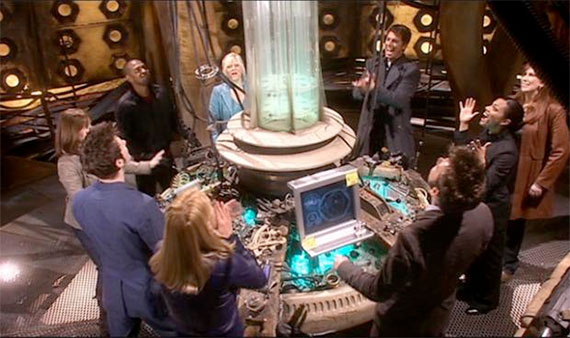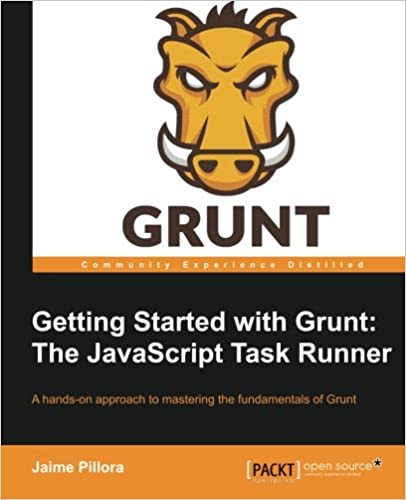; Date: Mon Jul 07 2008
Tags: Doctor Who »»»»
Wow. This episode picks up immediately following the previous ("The Stolen Earth") episode. At the end of that episode it looked like everybody was about to die, or had died. Sarah Jane was surrendering to Daleks, a Dalek was attacking Torchwood with Ianto and Gwen doing their best imitation of "let's go down fighting", and the Doctor had been shot by a Dalek and was regenerating. The big question from last week was this surprise regeneration of the Doctor since it's known David Tennant's contract went through 2010 (at least). Mere trifles... rather than regenerate into a new Doctor, the Doctor regenerated into himself. Weird trick if you ask me. And then to save Sarah Jane they had Mickey and Jacky materialize next to her car, with a huge gun for each, and blow away the Daleks. Oh, and Torchwood, they borrowed a scene from The Matrix and froze the bullets in time saying something about a Time Lock which Tash fortunately finished before she kicked off this mortal coil. Oh, and speaking of prisons (where Gwen and Ianto found themselves) these Daleks have some tricks, as a full blown Dalek Empire, which we haven't seen before. Such as disempowering a TARDIS regardless of the defenses it possesses.

The "Dimension jump" thingies that Rose & Jackie & Mickey have been using.. They "burn a hole in time and space" and later in the show Rose says something about them having developed those thingymajobs so that Rose could find the Doctor. So, really, this whole whoopdiedoo is because Rose had to have the Doctor regardless of the cost. She had to rip holes in time and space, had to tear apart the protection boundary which split off the universe she was in, just so she could find the Doctor, but the cost was the near destruction of everything. But that's getting ahead of the story.
We know what the Orsterhagen Key is... it's bloody stupidity if you ask me. What, destroy the earth as a kind of burned earth strategy? And gosh it sounds so weird/right to hear the Daleks speaking German. Anyway in WWII the Russians famously won against the Germans by destroying their countryside to deny the Germans use of the countryside. That's this Orsterhagen Key strategy, to destroy the Earth to deny someone else to use the Earth. Folly.
When the Daleks imprison the TARDIS and send it to the Crucible and then toss the TARDIS into the Crucible core, they say to the Doctor "You are connected to the TARDIS now feel it die". But the TARDIS actually doesn't die, because Donna's destiny is to save the TARDIS through circuitous means. It's hard to tell what the Doctor feels and I suppose if he felt the TARDIS's continued life he certainly wouldn't tell the Daleks.
A key theme in the story is how Donna Noble has a very poor self attitude, she's nothing special, she's just a temp, she's a nobody. This is so universal, most of us don't see our own magnificence and instead self-diminish and hold ourselves back. What would the world be like if we all embraced our own magnificence?
Again.. we have Martha Jones off on her own acting as an independent agent while the rest of the crew is working together. Why is that?
The collection of people they gathered in the Crucible to test the Reality Bomb... were they all associated with the Doctor? Or were they gathered randomly? I recognize many of these people from prior episodes... FWIW.
Their description of the reality bomb may sound like a bit of mumbo jumbo. But what they're talking about (sort of) is the theories in Quantum Mechanics about how the material universe is created. There are energetic patterns which go into making every bit of the material universe and those energetic patterns become matter through some mechanism that isn't completely understood at this time. However I suppose if there is a mechanism to collapse the probability wave to create matter there may be another mechanism to undo whatever causes the probability wave to collapse.
In a way this reminds me of Lord Shiva the Destroyer from Hindu mythology. In Hindu mythology there is a creation force and a destruction force, and the Daleks are certainly playing the Destroyer in this saga.
Oh and does Davros remind you of The Emporer from Star Wars? Anyway he certainly comes across as a madman nutjob out to kill everyone.
"The Children of Time will gather and one of them will die..he...he..he.." Caan is a real nutcase isn't he? But as we see later he really pulled the wool over everyone's eyes with this crazy-dalek show. But just who died? Unsure. Donna is the worst off but she didn't immediately die.
Sarah Jane.. she was part of the Doctors assignment in The Genesis of the Daleks .. it's so cool they (the writers and current stewards of Doctor Who) were able to arrange for Sarah Jane to be in this episode.
And... to reveal something deep about the Doctor. This is really a key thing about the Doctor, and amazingly Donna recognized it earlier in the season. The Doctor tends to turn his companions into warriors. All the people in this episode are ones whom he touched, and through that touch each of them became warriors and killers. The Doctor himself professes nonviolence but in the whole of the history of Doctor Who while the Doctor did not directly do violence (usually) it was the companions who did so.
It's interesting how, later in this show, when the second Doctor took an action that killed all the Daleks, that the other Doctor shunned him for the crime of genocide.
DoctorDonna... now we know what that is.. a two-way exchange of tissue, genetics, memory, knowledge.. wild. And what a way to resolve the crisis. To turn Donna from a know-nothing into a Time Lord spouting mumbo jumbo with the best of the Time Lords...
So... Davros, names the Doctor "Destroyer of Worlds". But, hey, every other time Davros has "died" he somehow escaped. He is the master of escape pods and whatnot. Surely we haven't seen the last of Davros, or have we?
"It's designed for six pilots but I've been having to do it single handed" ... what a realization, and what a treat to see a team flying the TARDIS.
This ending... in some earlier climax endings they seemed like a waving of a magic wand and a cosmic reset of reality. Like at the end of the Sound of Drums when they erased the whole year-long nightmare of the Masters rule over Earth, but at the end of that one they simply erased the year as if it never happened. That seemed like a cop-out. This time it was a real victory with nothing being wiped out. That is, except for Donna's memory.
This whole thing -- caused because Rose wanted the Doctor. So, she ends up with the Doctor in a weird-ass way of fulfilling her desire. Is this a way to keep Rose from recreating the problem in the future? She already destroyed the universe once through her desire for the Doctor, so to keep her from doing that again she is given a Doctor to live with? But is the Doctor she ended up with the one she wanted? Did she really want the Doctor or did she want that life of traveling the Universe and saving worlds?
"Dårlig Ulv Stranden" When the Doctor pronounces the name of this place it sounds a bit like "Dalek mumble mumble" and I wondered about that...
"That version of Donna is dead" ... so someone did die?
The story ends with what appears to be portrayal of loneliness. Just a few moments before the Doctor's TARDIS had been full of people in celebration jointly flying the TARDIS across the Universe. Sarah Jane exclaimed about how he plays the lonely man but in truth he has the biggest family on earth. One-by-one, however, they dispersed to their lives, leaving the Doctor alone with a forlorn look on his face.
All through the modern Doctor Who episodes it appears the Doctor has chosen Companions to fill a loneliness created by the Time War. His own people all died and that would understandably make for an interesting psychological wound to be the last of your kind in the Universe. But...?











